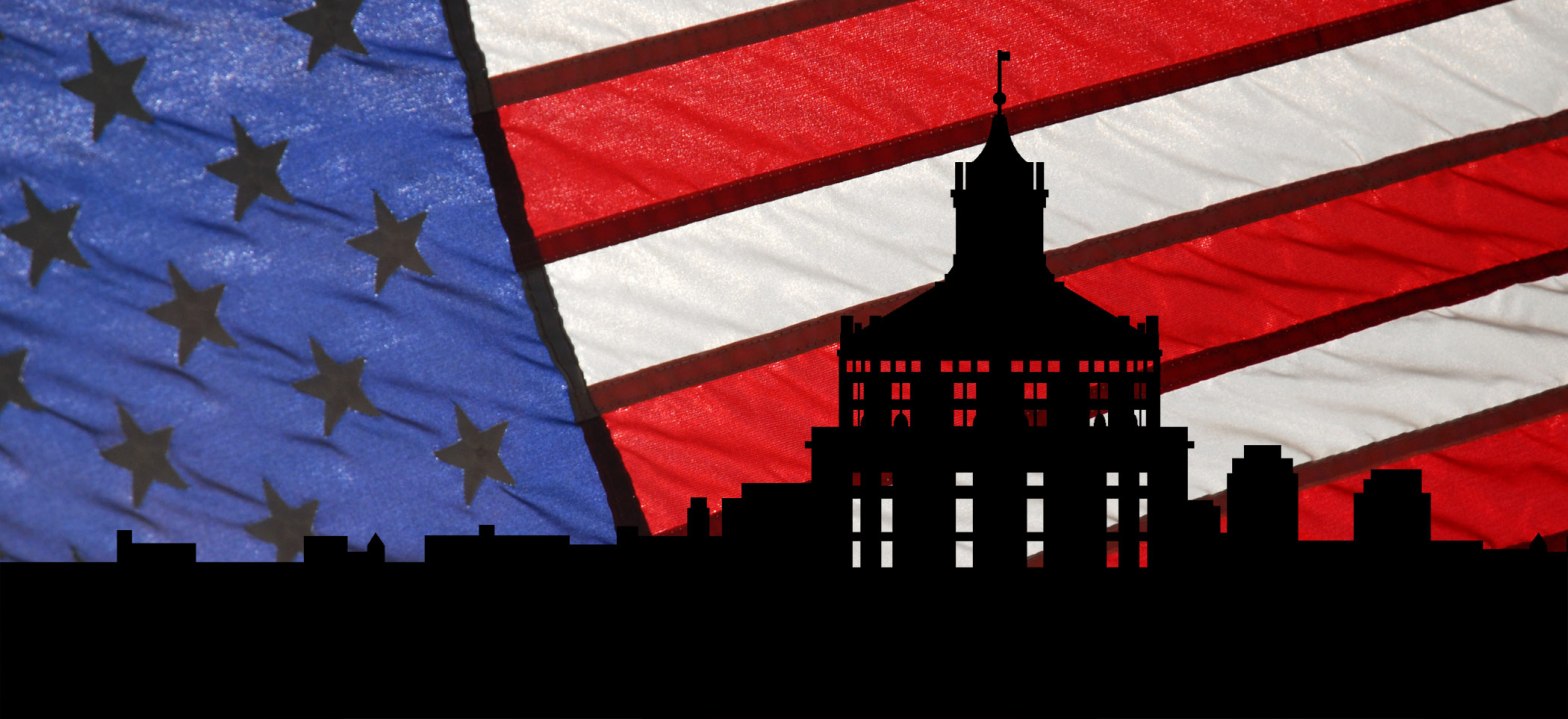‘I really didn’t think I’d be in line for two hours, but it’s OK.’
University students join the crowds to pay tribute to suffragist Susan B. Anthony.
Melissa Proven ’20
‘If it wasn’t for her, I wouldn’t be voting today. She’s the one who made it possible for all women to vote and I think it’s just an honor to be able to be this close to her and come out and see her on my first Election Day.’
Hannah Rosen ‘20
‘One of the candidates for president is a woman for the first time in our country’s history and the fact that she was the one to allow women to get the right to vote is really important, so the fact that she’s right here is amazing.’
Daniel LaSalle ’20
‘I want to pay homage to such an influential woman not only in American history, but world history. To be able to be here and bask in history, literally stare history in the face is something that is worth so much to me, I can’t even put into words.’
Brendan Stone ’20
‘It’s my personal belief that democracy works best when everyone participates. To be able to be here where Susan B. Anthony lays at rest…our electorate wouldn’t be the same today without her.’
Sarah Krulik ‘17
‘When I came here, I really didn’t think I’d be in line for two hours, but it’s okay. I think it’s going to be worth it just to have this experience of being in Rochester, putting a sticker on Susan B. Anthony’s grave, having hopefully the first woman president and it will be amazing.’
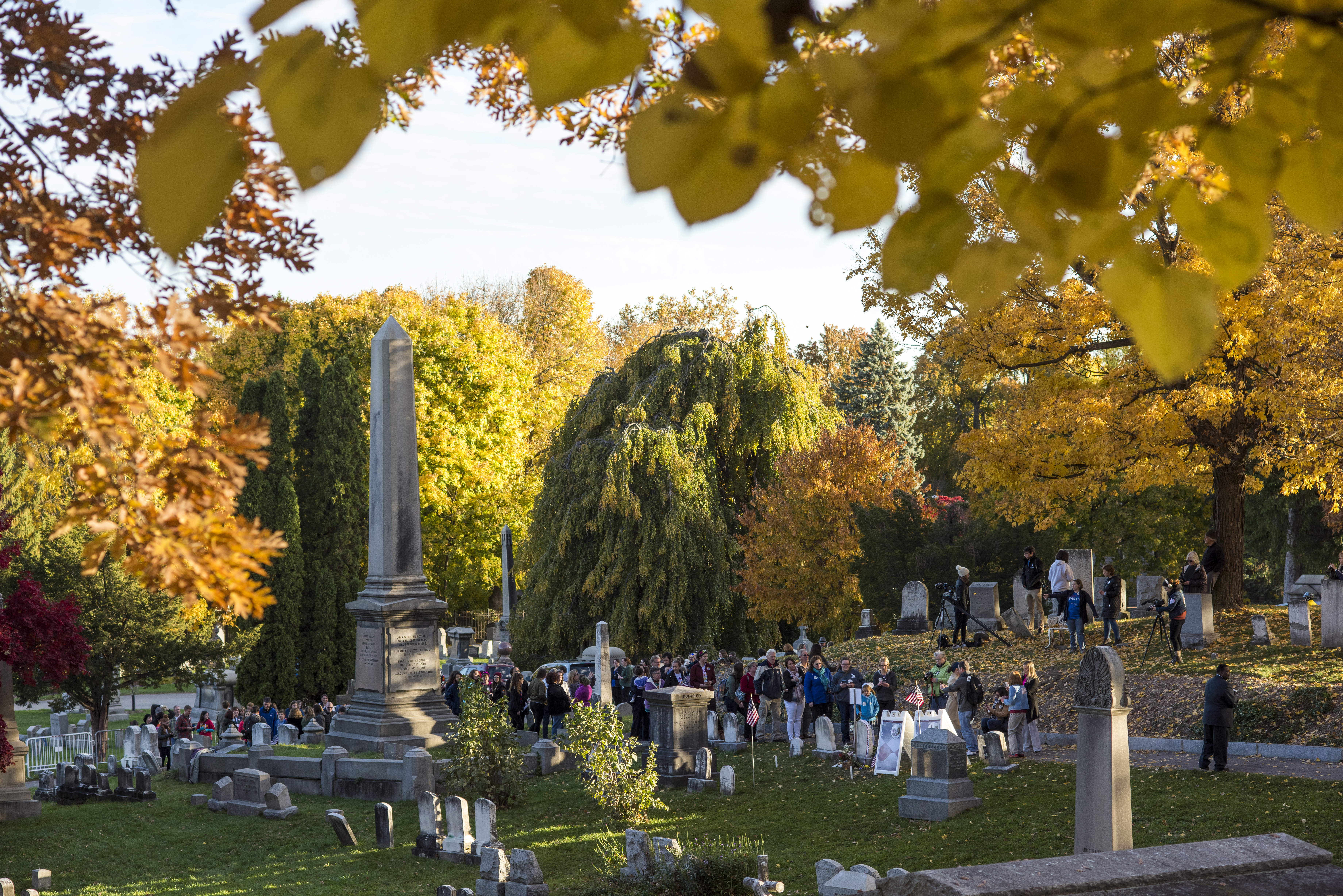

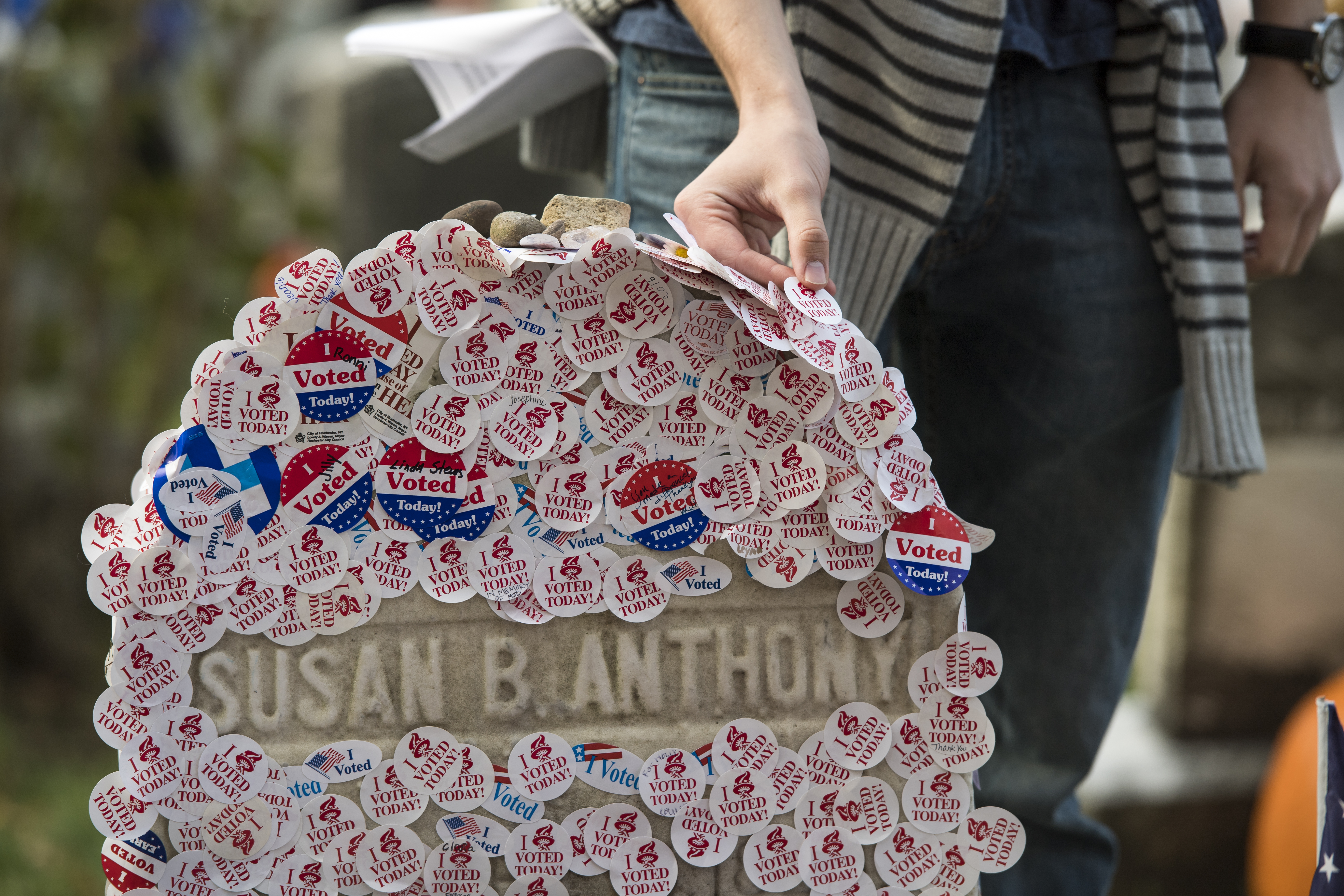

‘It’s a presidential election year. I had to take this class now. It’s too important not to.’
Professor Lynda Powell’s American Elections class zeroes in on Clinton, Trump matchup.
University Communications / Jim Mandelaro
As a freshman, Skylar Cerbone ’20 normally wouldn’t take Lynda Powell’s intermediate undergraduate course, American Elections, this fall. But Cerbone didn’t want to wait.
“It’s a presidential election year,” the political science major from Buffalo says. “I had to take this class now. It’s too important not to.”

Election Night Watch Party
The University community is invited to watch the election night coverage and results on Tuesday, November 8, from 8-11 p.m. in the Rettner Hall Atrium. Pizza and beverages will be served.
Election Day programming is sponsored by RCCL, UPSIRC, College Democrats, College Republicans, the Department of Political Science, Wilson Commons Student Activities, and the Burgett Intercultural Center.
Cerbone received permission from Powell, professor of political science, to take the course, and is one of 50 students who meet Tuesdays and Thursdays in Hutchison Hall to learn about the election process at the state, congressional, and presidential levels, and how election rules affect the choices candidates make.
“I want my students to apply the theoretical material from the course to gain a better understanding of this year’s elections and future elections,” Powell says. “While a few will go on to graduate school in political science and teach at the college level, and a small number will work in politics, I hope all of them will be engaged in the political process as voters.”
Powell has taught at the University since 1982. Her most recent book, The Influence of Campaign Contributions on State Legislatures (University of Michigan Press), was awarded the American Political Science Association’s 2013 Richard F. Fenno, Jr. Prize for the best book on legislative politics, and the 2014 Virginia Gray Prize for the best book on state politics and policy.
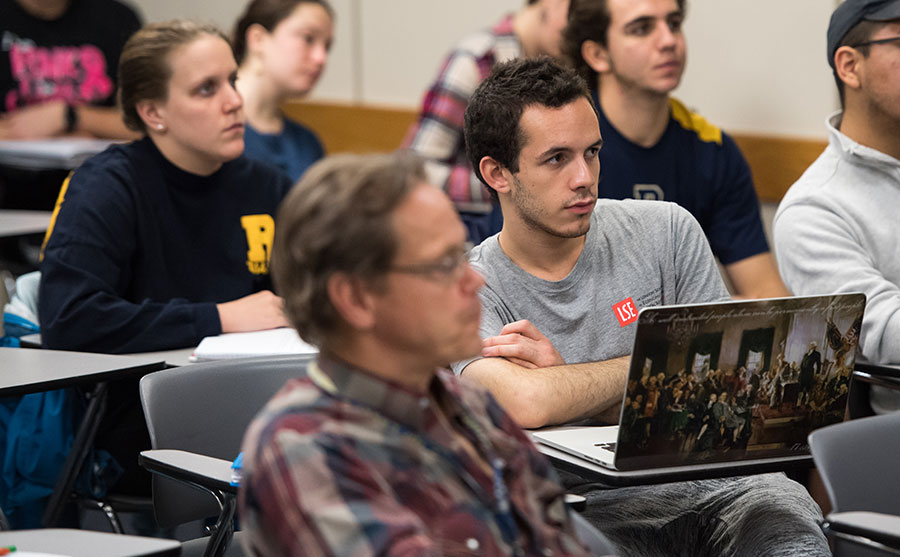
“She’s a distinguished professor,” says Jose Fernandez ’19, a double major in political science and history. “I took the class in large part because I wanted to get her take on this election.”
Fernandez is a self-described “political junkie.” He attended a Long Island high school that was 90 percent Hispanic and says, “Republicans shouldn’t even entertain the idea of getting the Hispanic vote unless they address immigration reform.”
Students in Powell’s class read scholarly articles, as well as print and online news, and apply insights from the reading, as well as their own, to the 2016 elections.
What questions should we be asking?
Robert Westbrook, Joseph F. Cunningham Professor of History, is a cultural and intellectual historian of modern America who has written extensively on the history of philosophical pragmatism.
Q: The remarkable presidential election of 2016 has raised many questions for American historians, but what are we to make of the “populism” that has roiled both parties in this campaign—in the person of Bernie Sanders on the left and Donald Trump on the right?
A: We have argued among ourselves about the similarities and differences between each of these two decidedly contrasting movements and the populisms of the 1890s (the People’s Party, from which the term derives, the 1930s (Huey Long), and the late 1960s (George Wallace).
My own view is that these current populisms, like those of the past, are expressions of what has been called the “democratic deficit.” They emerge when a significant portion of the public believes (often rightly) that its interests are not represented by the political elites elected or appointed to office. There is a yawning gap between their views on public policy and the policies enacted by these elites. At present, as a number of leading political scientists have demonstrated, this gap is enormous. Populist constituencies aim to close this gap, sometimes by plausible means (Sanders), and sometimes by ill-considered, even self-destructive, means (Trump). On occasion, American populism has modestly reduced the democratic deficit, but other times it has provoked elites to seek out more effective ways to insulate themselves from populist impulses. The latter seems to me more likely in the present moment. I recently wrote that we are consequently on the verge of losing our democratic republic. A friend responded that in her view it has already been lost. I fear she is right about this, but hope and faith forbids my believing it.
On a Thursday in October, the topic turns to the Electoral College. Students learn about swing states, pivotal states, and the magic number 270, the minimum number of electoral votes required to clinch the election.
They’re also taught about “faithless electors,” members of the Electoral College who don’t vote as they are pledged to vote.
“There have been 157 faithless electors in America’s history,” Powell tells the class, “but none have altered the outcome of an election.”
Andrew Mekhail ’20 will be voting for the first time and is eager to help decide who will become the nation’s 45th president.
“This class gives me an understanding of the framework of an election,” the political science major from Los Angeles says. “It’s a consequential election that will say a lot about our country’s values and where we stand. It’s beyond politics.”
Cerbone believes students on the River Campus have grown increasingly interested in the political process as the election draws near.
“We’re the generation that’s going to be affected the most,” she says. “College students care about college debt and the way women and minorities are treated in this country.”
Logan Williamson ’17 says he’s most interested to see what “the Sanders effect” will be.
“I’m very interested to see how high of a turnout rate there is for Hillary [Clinton] among millennials,” the chemical engineering major from Horseheads, New York, says. “I think there’s going to be a huge dropoff from President Obama [in 2008 and 2012].”
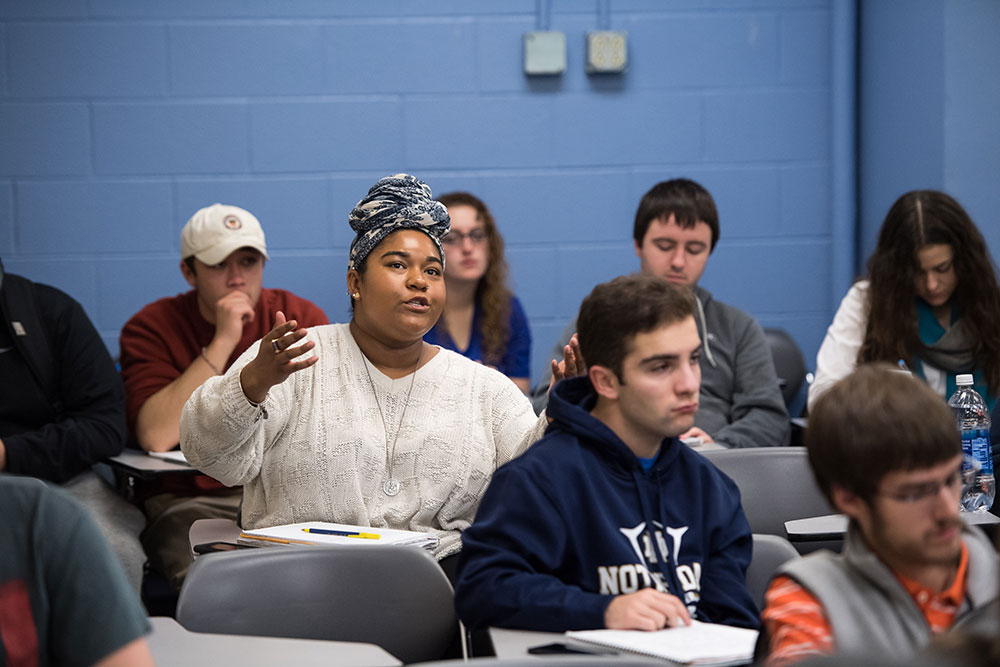
Powell hopes her class inspires students to vote.
“As Thomas Jefferson said, ‘An educated citizenry is a vital requisite for our survival as a free people,’” she says. “The differences between the candidates are so great that the stakes for the country are correspondingly great as well.”

‘Negative campaigning has been around as long as campaigning. It stays around because it works.’
Simon Business School professor explains why and how campaigns go low.
University Communications / Jim Mandelaro
It was a contentious campaign, with charges of sexual misconduct, corruption, and greed.
One candidate was labeled a criminal, the other a coward.
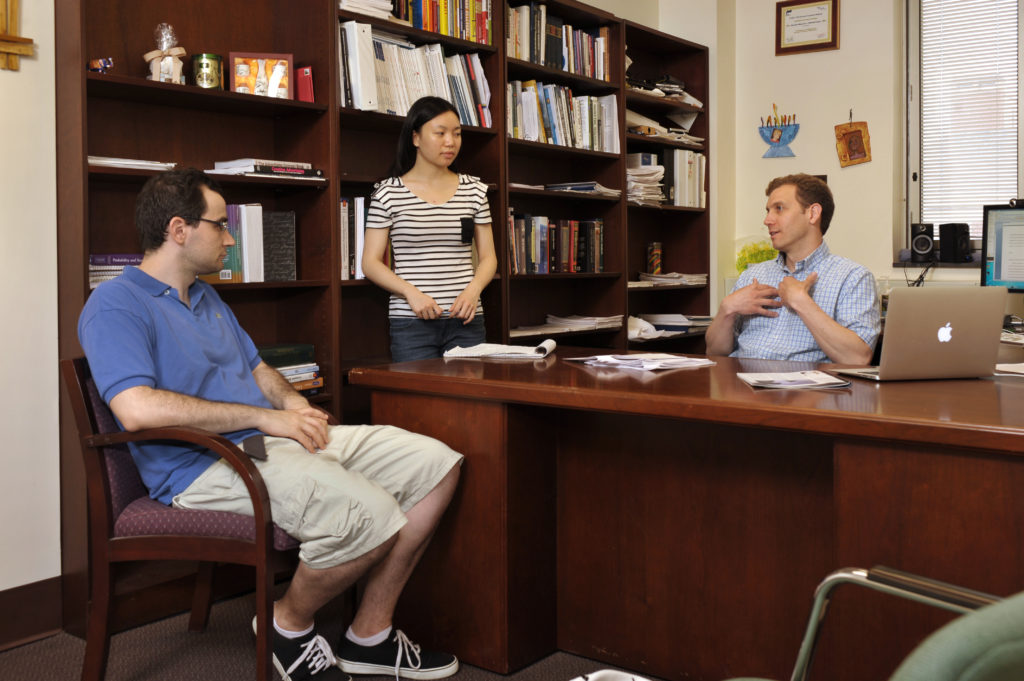
Personal attacks came on a daily basis.
Yes, the presidential election of 1800 was nasty, to use a word from this year’s campaign. In the end, Thomas Jefferson defeated incumbent John Adams, and the two didn’t speak for years.
Sound familiar? It should, says Mitchell Lovett, associate professor of marketing at the Simon Business School.
“Negative campaigning has been around as long as campaigning,” Lovett says. “It stays around because it works.”
Mitchell Lovett, associate professor of marketing at the Simon Business School, studies the effects of negative advertising in politics, a trend that he says has been on a significant rise over the last two decades.
What questions should we be asking?
John Osburg, assistant professor of anthropology, is a scholar of contemporary China. He examines changing attitudes in Post-Mao China toward spirituality, marriage, romance, education, and politics.
Q: China is frequently blamed for bleeding the United States of its manufacturing base. What are the nuances of Chinese manufacturing that Americans should be aware of?
A: I find the candidates’ image of China to be much more a projection of American anxieties than a reflection of realities there. Donald Trump, in particular, claims that China is stealing our manufacturing jobs and beating us in everything. This is highly ironic (and misleading) on two counts. The first is that manufacturing jobs in China are largely very low wage with extremely long hours and few protections or benefits for workers—a far cry from the glory days of unionized manufacturing in the U.S. Not only are Chinese workers increasingly unwilling to work under these conditions, but China’s leaders are also desperately trying to make their economy less reliant on export-driven manufacturing and more oriented around services. They recognize that there’s much more money to be made designing iPhones than manufacturing them.
Lovett has taught courses on social media and advertising in politics, and is an expert on negative political advertising. He’s found that the closest elections are usually the most negative, and that talking about the bad traits of a candidate becomes more effective the more you know about the candidate.
People also tend to remember negative traits more than positive ones.
“When you tell voters two positive traits about a candidate, they tend to average those out,” Lovett says. “But if you give them two negative traits, people add them together, and it makes a more lasting impression.”
Recent elections, in particular, have drawn comparisons to the 1800 presidential race. That’s because negativity has been on the rise in recent years.
Lovett points to data showing that, in every presidential election cycle from 2000 to 2012, campaign advertising, in aggregate, was more negative than in the previous one.
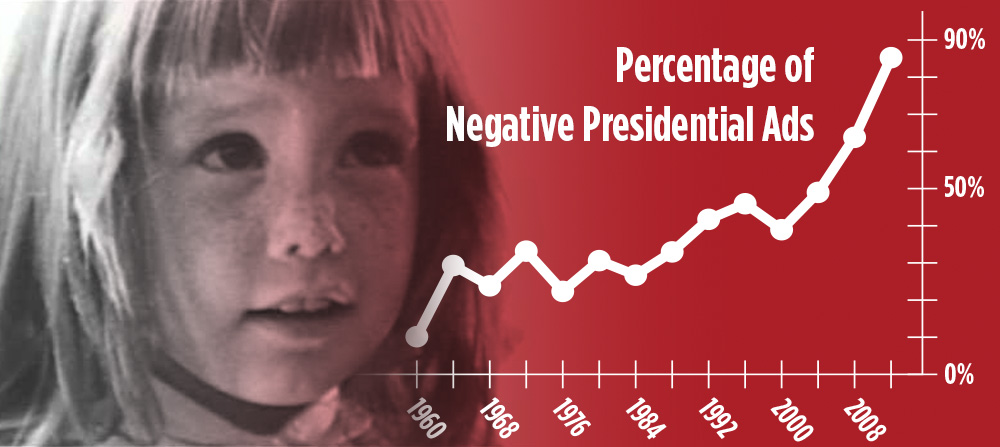
The 2012 clash between Barack Obama and Mitt Romney was the gold standard for negativity. In that race, almost 90 percent of ads were negative, meaning that the ad mentioned the candidate’s opponent. Between June 1 and Election Day, 64 percent of the ads aired were “purely negative,” meaning that only the opponent’s name was mentioned.
What questions should we be asking?
Narayana Kocherlakota, Lionel W. McKenzie Professor of Economics, is a former president of the Federal Reserve Bank of Minneapolis and an expert on economic policy.
Q: The bruising election campaign has revealed some deep divisions among Americans. What will it take to eliminate those differences?
A: I trace those divisions to people’s disappointment over economic outcomes in the past ten years. For example, output per person grew more slowly from 2005 to 2015 than in any prior decade since the end of World War II. It is possible, in my view, for the federal government to take steps to accelerate growth (like increasing infrastructure investment and providing tax incentives for private sector investment). But without that faster growth, I anticipate a hardening and deepening of the divides that we saw in 2016.
“The rise in negativity is probably correlated with changes in outside funding, though that is not yet clear,” says Lovett. He speculates there are most likely several factors at work, including a general increase in spending and increasingly conflict-oriented media coverage.
One thing that is clear is that, while the 2016 presidential contest between Donald Trump and Hillary Clinton has been strikingly contentious, the campaigns have actually run fewer negative ads in the last month than their counterparts in the 2012 presidential race. But that’s in large part because they are only running about half the number of ads. Candidates are relying less on paid advertising, and more on social media, to get their messages out. Trump has nearly 13 million followers on Twitter, and Clinton has 10 million.
“Trump especially has relied on social media and engagement with media outlets to get his message out there,” Lovett says. “My guess is traditional campaign managers would say he’s killing himself with this strategy. He says what he thinks. That’s both his appeal and his downside.”
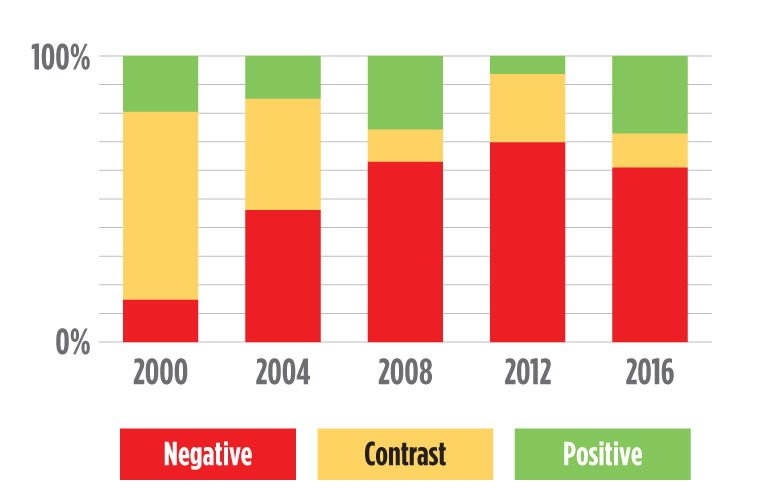
Clinton has used Trump’s own words against him in television ads. “On the margin, I think they’re effective,” Lovett says of the ads. “A lot of what Clinton says about Trump is reinforced by his own statements.”
He adds that Clinton has “some weak spots,” and those have “gotten play for people on the Republican side, too.”
No matter the content of an ad, repetition is key.
“People often forget the source,” Lovett says, “and after many repetitions, they may start to believe the message simply because they keep hearing it.”

‘Every decision they make affects the rest of the world.’
Although international students are not eligible to vote, they have plenty to say about this year’s American presidential election.
University Communications / Joy Bian ’17
We asked several students for their perspectives of the election in general, the presidential debates, and how they view the Trump and Clinton campaigns. Here’s a sampling:
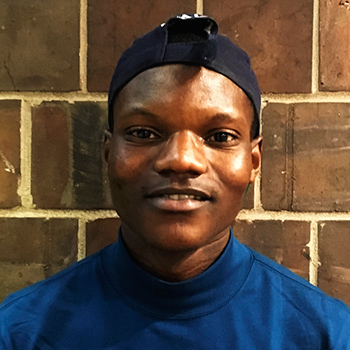
Rafael Muchanga, Jr. ’18Home country: MozambiqueMajor: chemical engineering
“The nominating conventions here provide a great opportunity for voters to get to know each candidate and make a responsible decision. I imagine the U.S. being one of the most powerful countries in the world, and every decision they make affects the rest of the world. If the U.S. is governed by someone with Machiavelli’s sort of power, it will screw up the rest of the world.”

Yashika Patil ’17Home country: IndiaMajor: business
“I was shocked to learn the number of people who actually support Donald Trump. I understand that people don’t trust Hillary [Clinton], but I don’t think it is a valid enough reason to support someone so vapid, uninformed, and a tyrant.”

Ruairi Conway ’17Home country: IrelandMajor: digital media studies
“If I had the right to vote, I would go for Hillary [Clinton]. I know a lot of people don’t trust her, but compared to Trump, she has more specific policies in mind. I think people who vote for Trump vote for his promise of big changes. I can see why people would rather vote for radical change when they’re not happy. But this is not the election to do that.”
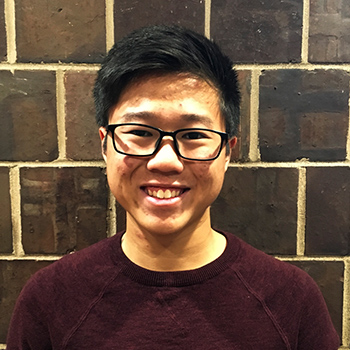
Edgar Yau ’20Home country: Hong KongMajor: undecided
“As an outsider, I think Trump shouldn’t be representing the United States because his views of race, education, and wealth are very distorted. As a U.S. president, what he says embodies the whole country, so this person has to show a certain level of knowledge, but apparently he does not.
“Most of my peers are very liberal so they like Democratic Party more. Even though Hillary [Clinton] is a little bit shady and disingenuous, she shows more caring for the people and the country, and her policies are more progressive.”
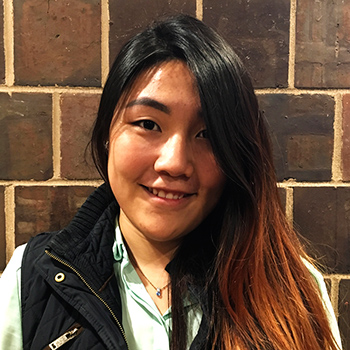
Zeqing (Kate) Zheng ’17Home country: ChinaMajors: international relations; psychology
“Donald Trump pronounced ‘China’ as ‘Gina’ so many times at the first presidential debate. It is understandable that Trump wants to project an image of China as a threat to the U.S. But at the same time, a lot of the evidence he used to portray China as the big, bad guy is factually incorrect. His false accusations and descriptions are disrespectful to the country itself.”
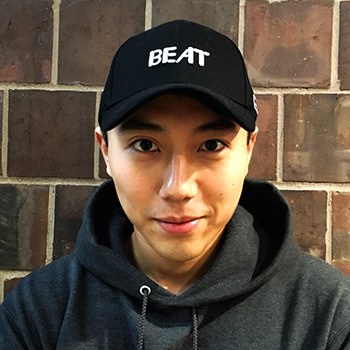
Woo Tag Kim ’19Home country: South KoreaMajor: business
“Trump’s foreign policies are really unacceptable to me. We currently have U.S. soldiers based in South Korea to balance the military power from North Korea. If Trump is elected, I’m afraid that the whole U.S. Army will be withdrawn, which does no good to either of us.”

‘Yes you shall have the autograph of the first woman who legally registered and voted in the state of New York.’
Collections in Rare Books, Special Collections, and Preservation give a voice to the rich history of women’s suffrage.
River Campus Libraries / Lori Birrell
It is widely recognized that the campaign for the 19th amendment — “The right of citizens of the United States to vote shall not be denied or abridged by the United States or by any state on account of sex” — began on July 19, 1848, on the first day of the first women’s rights convention, which took place in Seneca Falls, about one hour from Rochester. Written by Elizabeth Cady Stanton, the Declaration of Sentiments signed at that convention included the grievance, “He has never permitted her to exercise her inalienable right to the elective franchise.” What began at the Seneca Falls Convention in 1848, eventually spread throughout the country as the issue of women’s rights continued to permeate the nation’s consciousness. The activism and activity culminated in the ratification of the 19th amendment, some seventy-two years later.
The collections of the River Campus Libraries’ Department of Rare Books, Special Collections, and Preservation give voice to this rich history. One of the key collection strengths in the library relates to women’s rights and suffrage. Through letters, photographs, newspaper clippings, pamphlets, broadsides, and banners, the history of women’s suffrage is preserved and made available for research to the University community as well as the community at large.

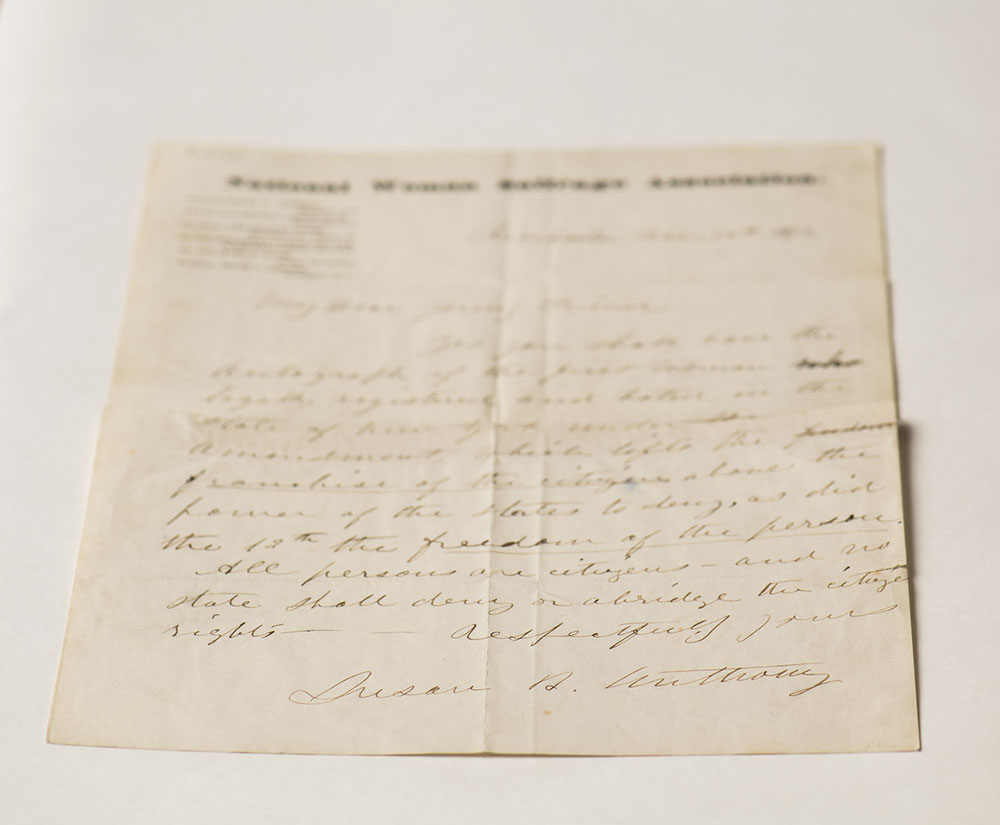
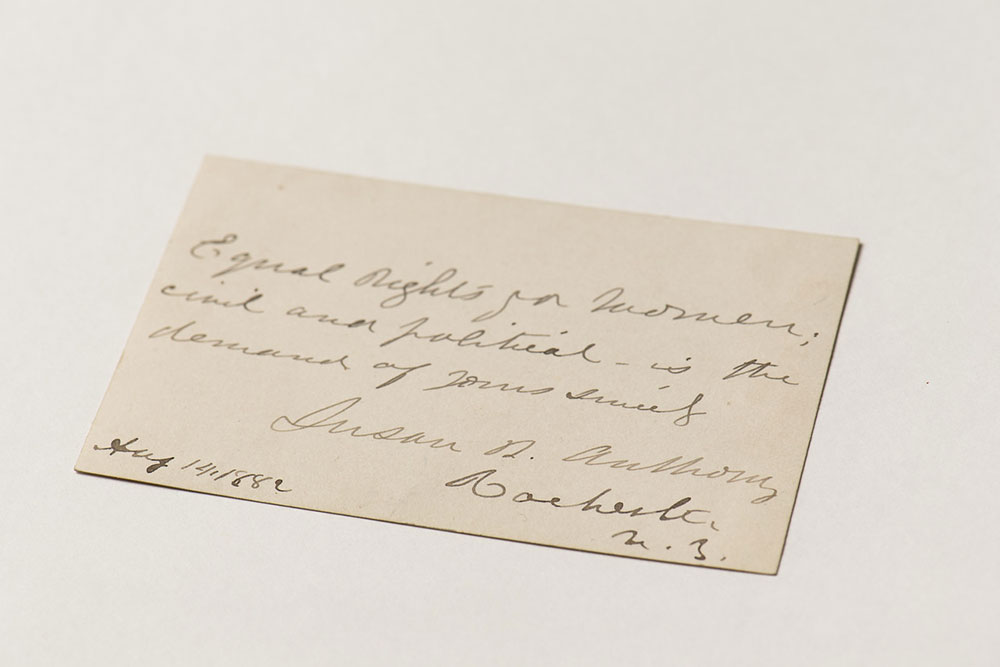
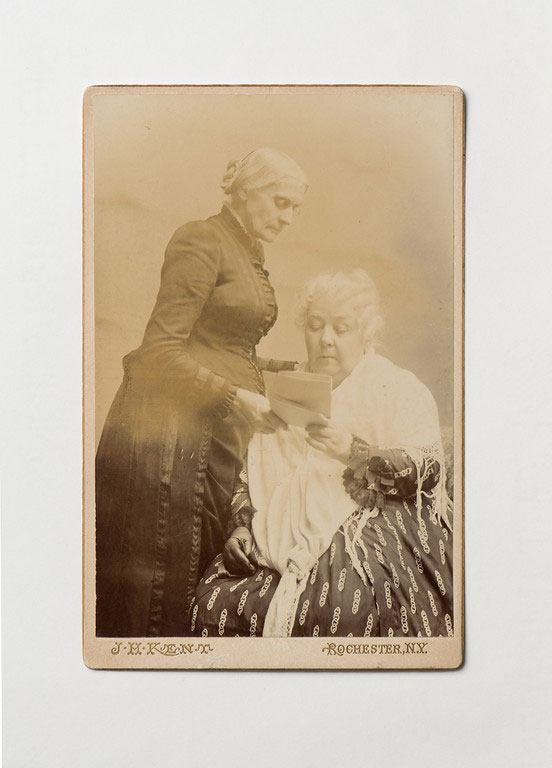
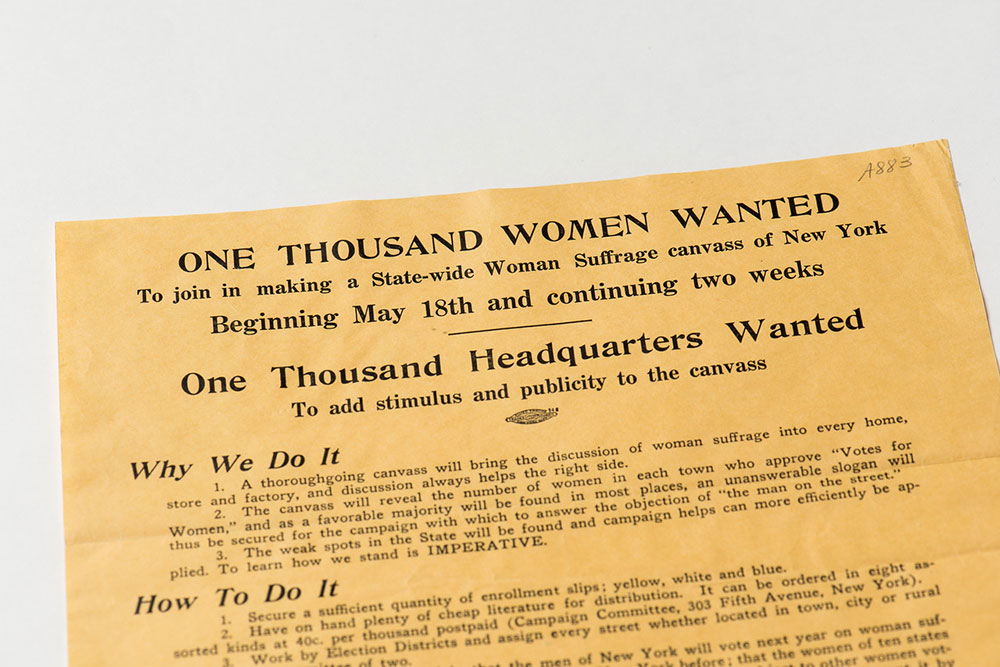

‘You’re making your voice heard.’
For student leaders, political engagement takes many forms.
University Communications / Danielle Douglas ’17
What questions should we be asking?
Pablo Sierra, assistant professor of history, specializes in the African diaspora in Latin America, colonial Latin America, and urban slavery.
Q: How will the 2016 presidential race affect Hispanic/Latino voting in future elections?
A: A recent investigation by the Pew Center establishes that Hispanic/Latino voters continue to identify the Democratic Party as the political party most concerned for their well being. This trend has persisted with minor fluctuations from 2002 to 2016. In the four years since Obama’s re-election, the Latino perception of a concerned Democratic party has fallen seven points. The much-publicized deportations under Immigration and Customs Enforcement (ICE) certainly have not helped the DNP’s cause. Yet Republicans have failed to seize this opportunity by allowing a political extremist onto the national stage. Moderate Latino Republicans, such as Nevada governor Brian Sandoval, have been invisible in the current presidential campaign.
The Trump candidacy has alienated a considerable swath of the Latino electorate by way of its attacks on Mexican immigrants (and by extension, several generations of their American children). Ironically, Trump could have found some support among this largely Roman Catholic constituency and their conservative views on abortion. All for naught. The ongoing feud between the Republican candidate and media savvy Latino figures such as Jorge Ramos, Alicia Machado, and others, has and will continue to erode support for the GOP.
At 27 million voters and counting, the Latino electorate is best defined by its youth (nearly half fall within the millennial category). For many of these young men and women, their first electoral experience will be closely associated with the toxic rhetoric of the Republican candidate. Repairing this negative association will take quite some time.
There appears to be one category in which University of Rochester students are merely average—that’s when it comes to their political involvement. According to the National Study of Learning, Voting and Engagement, eligible University students had a 42 percent voter turnout rate in the 2012 presidential elections. This compares closely with an average 47 percent turnout at private research universities across the United States for the same year.
Unsurprisingly, the 2014 midterm elections elicited far less involvement, with a 13 percent student participation rate as compared to 18 percent nationally.
“It’s important for students to be politically engaged every year, because most University of Rochester students are of an age when they have only recently become eligible to vote and are forming their political opinions,” says Glenn Cerosaletti, assistant dean of students and director of the Rochester Center for Community Leadership. “Their active participation in the democratic process is important for setting the stage for a lifetime of civic involvement.”
Several University students have shared stories about their experiences with the political system and why they think it’s important to be politically engaged.
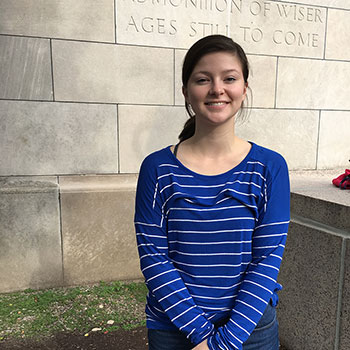
Alexis Wallace ’18Hometown: Fort Drum, NYMajors: Russian and political science
Growing up, Alexis Wallace never remained in one location for very long. Both her parents are family practice physicians in the military. She was born in the state of Georgia, and has lived in Germany, Washington state, Texas, and New York. Wallace says that because she was never truly connected to one place, she was constantly exposed to different political perspectives.
Even though Wallace now serves as the president of the College Democrats, she has never stepped into a polling center.
“My parents always voted absentee because we moved around so much,” she says. “I’ve never actually seen my parents go to vote.”
Wallace works in the Rochester office of Congresswoman Louise Slaughter, and is now considering registering to vote in Monroe County, as opposed to her current hometown.
“It was such a great experience to work for Congresswoman Slaughter–I wish I could cast my vote for her,” Wallace says. “But then, my vote may matter more where my parents are. It’s a very, very conservative area.”
Scott Onestak ’17Hometown: New Wilmington, PAMajors: Economics and data science
Like the majority of undergraduates, Scott Onestak has never voted in a presidential election. But he has taken every opportunity to participate in the political process.
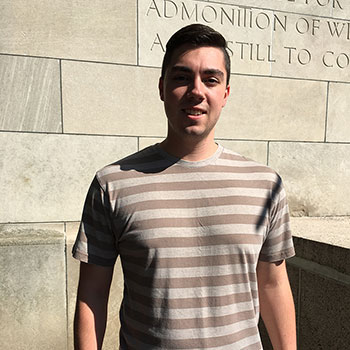
Each year at Rochester, he has diligently filled out his absentee voter ballot. This past spring, he was home during the presidential primaries and was able to place his vote at his local polling center.
Onestak is the president of the College Republicans. For the first time in its history, the group chose not to endorse the party’s nominee, Donald Trump. Onestak says the nature of this election has brought up important conversations.
“The dichotomy is quite stark, seeing that we have the two most unliked candidates ever,” he says. “I think the interesting thing is going to be how many people don’t vote for one of the major parties.”
Onestak has been exposed to conflicting political viewpoints since he was young—his family is split along party lines. His father is a Republican and his mother is a Democrat. But studying diverse topics and getting involved at the University has helped refine his political perspective.
“I think college makes you look more critically at issues, but that doesn’t mean you’re going to move one way or another.”
Riva Yeo ’18Hometown: Chino Hills, CAMajors: Economics and political science
One issue that drives Riva Yeo’s political activism is feminism.
When she began studying at the University, she got involved in College Feminists. She says it has given her an entirely different perspective on why voting is important.
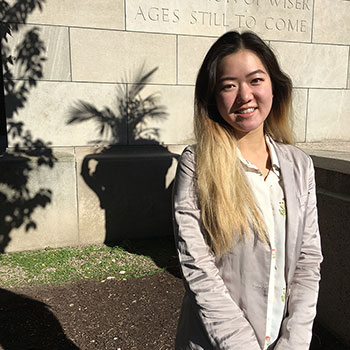
“As students, we’re told ‘you need to vote because it’s your right and you need to exercise it,’ but there are so many more dimensions that come into play in politics,” Yeo says.
Feminism was important to Yeo even before beginning at the University. When Yeo’s mother was in her late 20s, she immigrated to the United States from China. She’s faced challenges as an immigrant woman, and has been working hard to establish herself ever since.
“Watching my mother has reinforced my commitment to advocating for feminist issues and for political engagement,” Yeo says.
Now, as a member of the Committee for Political Engagement, she hopes to inspire other students to get involved with political issues.
“Talking with people of different viewpoints and learning more about progressive causes like reproductive rights, economic freedoms, and the gender gap are all things that have really resonated with me,” she says. “I think that’s what has shaped and solidified my desire to become active in the political process.”
Alphonse Mugisha ’17Hometown: Syracuse, NYMajor: Electrical and computer engineering
Alphonse Mugisha immigrated to the U.S. with his family when he was 11 years old. He was born in Burundi, a small, east African nation, but grew up in a refugee camp in Tanzania. After years of applying, his family was resettled in Syracuse, New York. He attended middle and high school in Syracuse, learning English along the way. Just under two years ago, he was finally able to apply for citizenship.
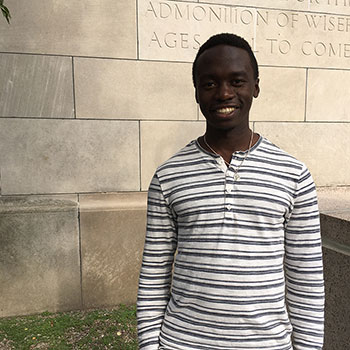
Even though he has not yet voted, Mugisha has been politically aware for a number of years.
“In 2008 I was in eighth grade, and I had only been in the U.S. for a year,” Mugisha says. “I just remember it was the first time a black person was running for president. When he won, it was really interesting to me that it was such a big deal.”
Now, he’s looking forward to being able to participate in the election as a voting citizen–especially in a year when the candidates represent such distinct political and personal perspectives.
“I think it’s very important to go out and vote even if it may seem that it doesn’t count,” Mugisha says. “You’re making your voice heard.”

